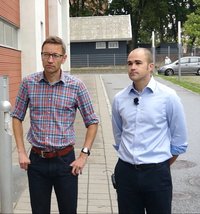INDR editorial, March 2017

Editorial: Mr. Phelps Goes to Washington
INDR Newsletter, March 2017 editorial, by Ask Vest Christiansen and John Gleaves
In the United States, politicians have returned to doing (well, more or less) what they are used to doing. Amidst the normal debates over taxes, laws, and partisanship, at least one member of the United States’ House of Representatives remembered the rule stating that every doping scandal must be followed by a hearing with lots of cameras, preferably sport celebrities, and resolute promises to finally solve the problem of drugs in sport. Thus on February 27, 2017, Olympians Michael Phelps and Adam Nelson joined Travis Tygert, the CEO for the United States Anti Doping Agency, and WADA officials Richard Budgett and Rob Koehler. https://www.washingtonpost.com/sports/olympics/wada-official-tells-house-subcommittee-its-time-for-change-in-doping-efforts/2017/02/28/55e96908-fde6-11e6-8f41-ea6ed597e4ca_story.html
While the presence of Tygert, Budgett, and Koehler at such a hearing is obvious, it was less clear what Phelps and Nelson had to offer the hearing that investigated the flaws in “the international doping system and discussed improvements that could bolster trust in the process and safeguard the integrity of sport at the highest levels.” http://www.reuters.com/article/us-sport-doping-congress-idUSKBN1672OS
Some of us at the INDR might have hoped Phelps was going to take up our call and advocate removing cannabis from the banned substance list.
Instead, Phelps took a leap from the high-dive with the bold claim that, “I don't believe I've stood up at an international competition and the rest of the field has been clean.” Perhaps Phelps’ ability to beat such drug cheats en route to becoming the most decorated Olympian of all time, including 23 gold medals, is only further proof of his greatness. One can only imagine how many more gold medals he might own had the field been entirely clean. Or perhaps it was only the slow ones who doped? At any rate, none of the politicians thought to ask a follow up question to that claim before posing for photographs with Phelps after the hearing. https://cnsmaryland.org/2017/02/28/olympic-gold-medalist-phelps-international-sports-plagued-with-doping/
More prescient, perhaps, was Phelps’ claim that “I know when I do stand up in the U.S. I know we're all clean because we go through the same thing.” For doping historians, Phelps’ words echoed those of American track and field coach Brooks Johnson, who defended his “clean” American while impugning the Soviet rivals at the 1983 World Championships. Brooks added that, “We think we have everything to gain from stricter doping tests.” http://www.nytimes.com/1983/08/16/sports/scouting-drugs-and-sport.html
Brooks claim appeared in print one week before twelve American track and field athletes boarded a midnight plane from Caracas, Venezuala to return to the United States. In what would become known as the Caracas Affair, increased drug testing at the Pan American Games in 1983 resulted in a number of positive tests for American athletes, which prompted the remaining ones to either leave the country, come down with an injury, or simply underperform to avoid testing. The American sports magazine Sports Illustrated called the Caracas affair one of “the broadest and most publicized drug scandals to hit amateur sports.”[i] http://www.si.com/vault/1983/09/05/619517/caracas-a-scandal-and-a-warning.
As numerous INDR scholars have pointed out over the years, the history of doping is rife with such hypocrisy. Had someone pointed out the panel of politicians the degree to which this hearing mirrored so many of the past hearings, then perhaps politicians might have asked harder questions than they did. Ultimately, the hearing ended predictably with calls for more resources, more independence, and the need to do something now. So if the past is any predictor of the future, we will probably be back here one more time.
Speaking of returning back to familiar places (how’s that for a segue), let us remind you about the 2017 INDR conference hosted at Aarhus University, Denmark on 24-25 August. Authors from any field are encouraged to present research that relate to the conference theme or to themes related to the INDR mission. This year’s theme is “Doping in sport, doping in society – lessons, themes, and connections”. Due dates for abstracts to be considered for the conference is 14 April 2017, via the INDR online submission; Easychair. It should be straightforward to use the system, but in case you need instructions for using the Easy Chair submission system you will find them here.